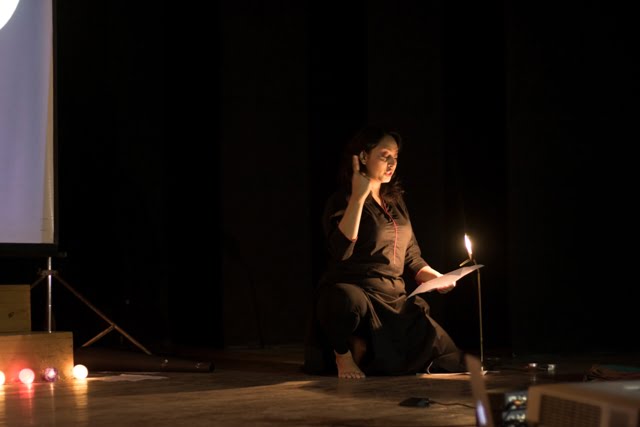Her great grandfather’s ghost haunts her whenever she goes up on stage; it’s the story of a girl who is struggling to act like a girl on stage and her great grandfather who was a female impersonator in late 19th century. Documentary theatre artist Anuja Ghosalkar has brought us the flavour of documentary theatre through her play Lady Anandi.
Anuja runs a theatre company called Drama Queen in Bengaluru. She has introduced and is trying to develop documentary theatre in India. She wrote Lady Anandi in Sweden, where she went as a script-writing scholar. Talking to us, she shared, “I run a company in Bengaluru, a theatre company called Drama Queen and we are trying to develop a new form of theatre in India called documentary theatre.”
The story has evolved through Anuja’s own reminisces – her great grandfather was a female impersonator in late 19th century Marathi theatre. “He acted in the theatre hundred years ago, now hundred years later I’m on stage. I’ve always been told that I’m not lady enough and I need to be more feminine and I found that quite hilarious,” shared Anuja.
Her hunger for creativity and to add more to it always leaves her with an incomplete and unfinished impact of her plays every time she performs. Recently, she performed at the Sari Festival held at Alliance Francias. “Sometimes, I add scenes, I subtract scenes and then there are times when I just change it around. Like this time, it is part of the Sari Festival, so we are really re-thinking of sari in the play,” said Anuja.
“The story idea came to me thinking that there are two actors separated by hundred years, he, who can play a lady convincingly and me, who’s struggling to be a lady on stage. And, that’s the idea behind the performance. Because, I don’t have money, I don’t have a director, it’s incomplete, unfinished. But people seem to be really enjoying it. My friend is helping me with the technical part, she met me yesterday and she’s doing it. So, if there are mistakes, it’s fine, we get very scared of making mistakes on stage. But it happens no,” she added.
Drawn from real-life testimonies, a documentary play is usually described as a complex form of performing arts, which is more factual and less imaginative. In most instances, playwrights work on pre-existing resources – like journals and reports – or actual human accounts to write the scripts of these plays. Also referred to as verbatim theatre, this drama form is relatively new in India and is currently causing a lot of curiosity among learners and connoisseurs.
Anuja was shocked by the fact that, somehow, her great grandfather has been left out of history books and there’s no documentation of his work. He was a Marathi theatre artiste in late 19th century and his plays created quite a buzz as they were banned by the British government and he had drawn criticism for working as a female impersonator, both from family and friends. Luckily, Anuja found a book mentioning her great grandfather’s work and contribution. So, she ended up creating fiction in the parts that are missing from the documentation of his work and is recreating the information available.




